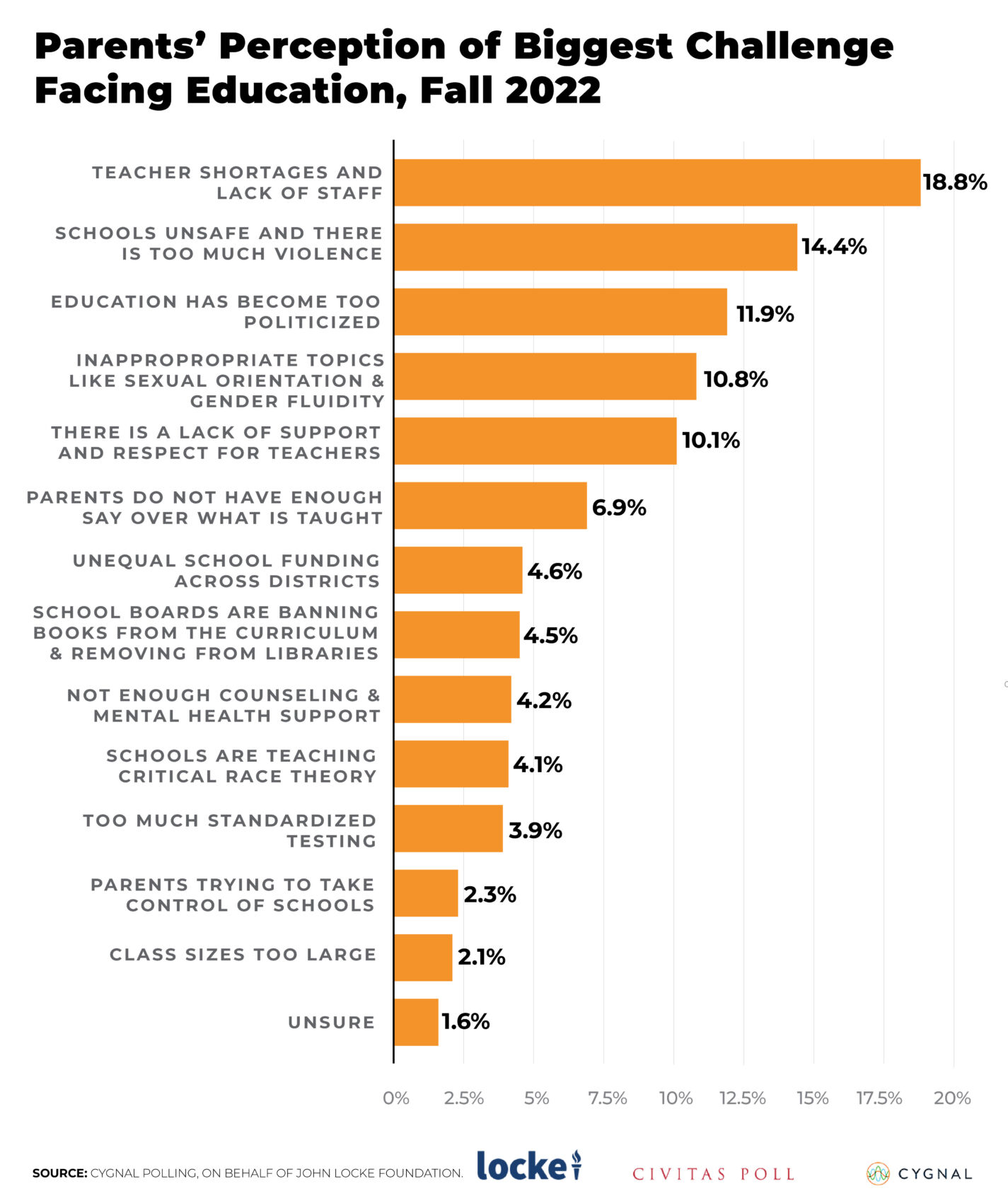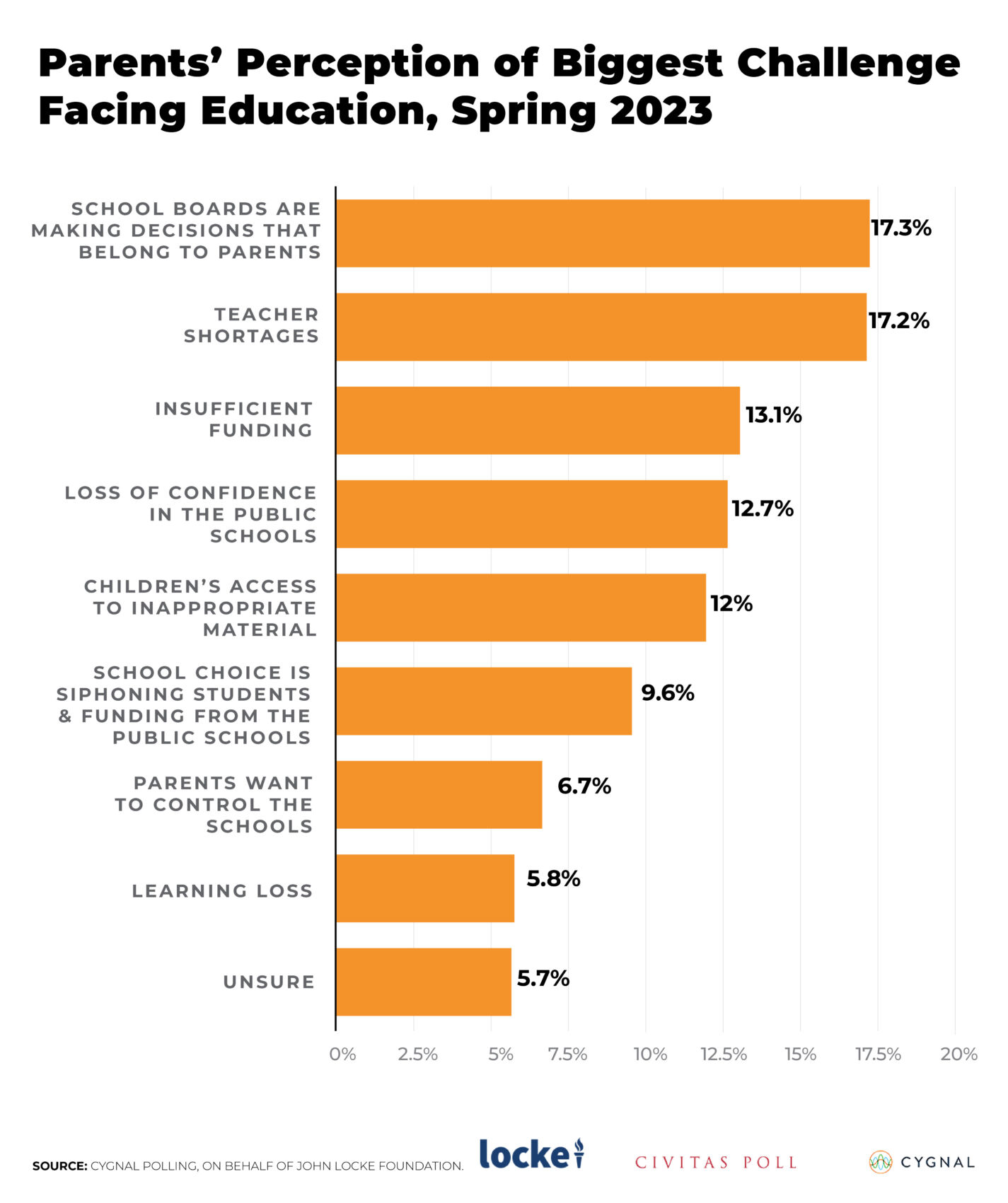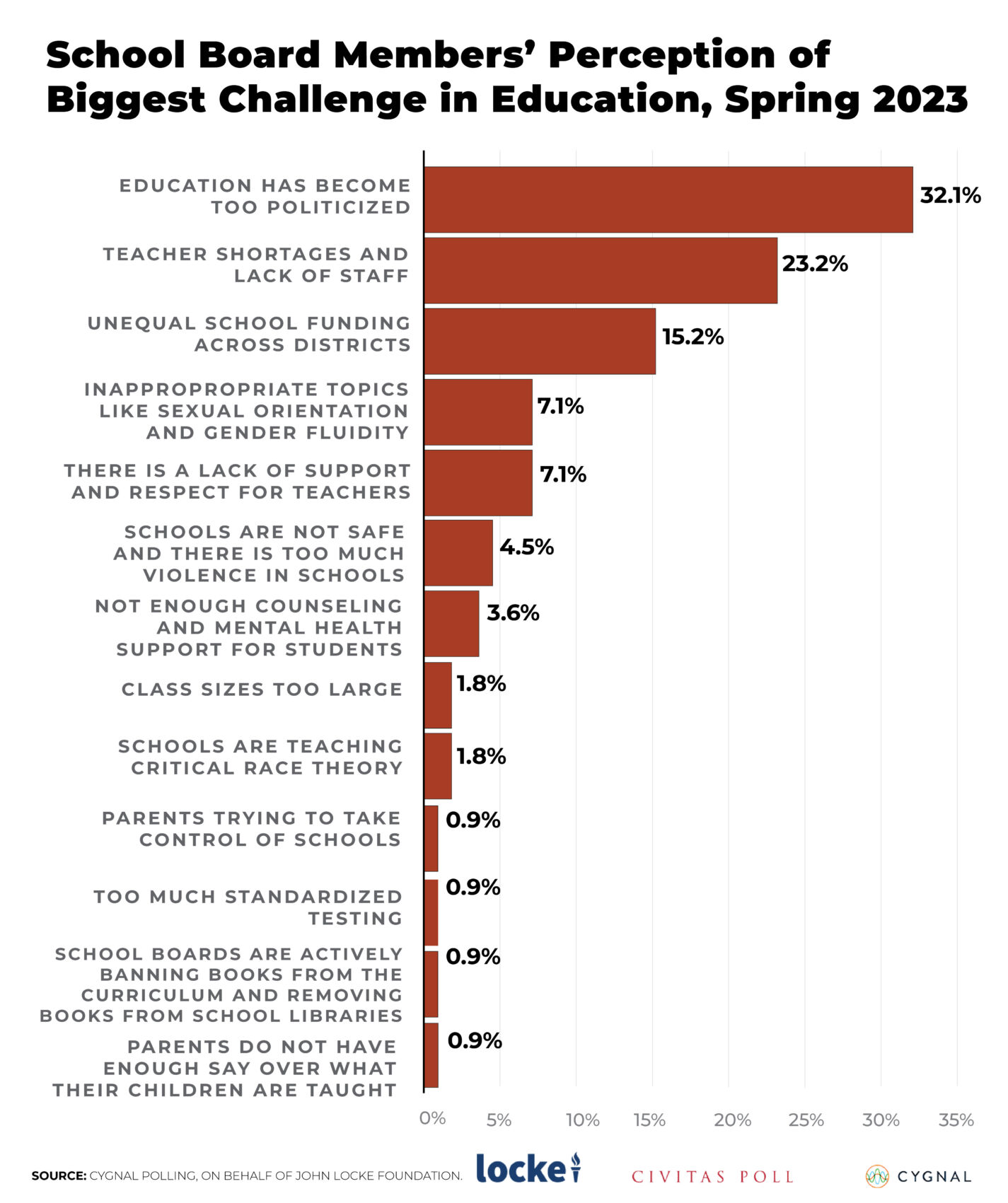- North Carolina parents and school board members identified teacher shortages as one of the biggest challenges facing education, according to recent polling
- Data show that during the 2021-2022 school year, only about 8% of teachers left the profession, and school districts reported around 5,000 teaching positions not staffed by a permanent, fully licensed teacher
- Reforming the teacher pay scale to reward teachers for excellence could help not only attract and retain high-quality teachers, but also raise student achievement
Parents and school board members say that teacher shortages are a major challenge facing education in North Carolina, according to poll results released by the John Locke Foundation.
This spring, Locke commissioned two polls to discover more about the opinions of parents and school board members concerning important issues in education. We also surveyed parents in September 2022. Although both groups identified many challenges in education, and even though concern about teacher shortages has declined among parents since last fall, the issue remained one of the top three concerns that parents and school board members had about education.
Last fall, a plurality of parents (19%) said that a shortage of teachers and staff was the biggest challenge facing education. Unsafe schools (14%) and politicized classrooms (12%) rounded out parents’ top three responses.

The Spring 2023 parent poll found a smaller percentage of parents (17%) who said teacher shortages were the biggest problem, while a slightly larger percentage responded that the most significant problem was school boards usurping parental authority. Thirteen percent of parents thought insufficient funding was the biggest hurdle.

School board members also appeared concerned about unfilled teaching positions. Nearly a quarter of respondents (23%) reported teacher shortages as public schools’ biggest challenge, while nearly a third (32%) said it was the politicization of education, and 15% thought it was unequal funding across school districts.

The results from the polls raise the question: How worried should parents and school board members be about teacher shortages?
The Good News: Most Teachers Are Choosing to Keep Teaching
Data show parents and school board members can take heart: Most teachers in North Carolina are choosing to stay in the classroom. Between March 2021 and March 2022, the state employed 93,832 teachers in public school districts. Of these, 7,298 are no longer working in the system. Thus, as the most up-to-date “State of the Teaching Profession in North Carolina” report disclosed, “Generally, North Carolina teachers are remaining in the classroom. The overall state attrition rate for 2021-2022 is 7.78%,” a decline of 0.4% from the previous year. According to the report, North Carolina’s teacher attrition rate is similar to that of other professions.
Furthermore, the most up-to-date numbers from the North Carolina Department of Public Instruction show that during the 2022-2023 school year, there were about 5,540 teaching vacancies on the first instructional day. That number dropped to about 5,091 by the 40th instructional day, but “[i]n many cases, the positions that were reported as vacant on the first instructional day were different from the positions that were reported as vacancies on the 40th instructional day.” A vacancy was defined as “an instructional position (or a portion thereof) for which there is not an appropriately licensed teacher who is eligible for permanent employment.” Under that definition, teaching positions that are staffed by substitutes, retired teachers, or teachers with provisional licenses would be classified as vacancies, so the actual number of unfilled teaching positions could be smaller.
Of course, the state’s overall teacher attrition rate and vacancy data don’t paint the full picture of individual school districts, which might have greater-than-average difficulty in attracting and retaining teachers. It’s an important problem to address, since high-quality teachers are one of the most important factors in ensuring student success.
The Proven Merit of Merit-based Teacher Pay
So, what can be done to keep excellent teachers in the classroom?
Policymakers and pundits routinely advocate for increasing teacher pay. This solution, however, is overly simplistic, ignores other factors that can cause teachers to walk away, and overlooks barriers that prevent talented professionals from entering the profession. Rather than simply advocating for higher teacher pay, policymakers should look deeper and address the underlying issues that cause teachers to leave the profession.
One of the best ways to attract and retain high-quality teachers would be to reform the teacher pay scale to compensate teachers based on merit.
Currently, North Carolina’s salary schedule for teachers is tied to credentials and years of experience, rather than merit. Teachers who go above and beyond to raise student achievement aren’t recognized for their accomplishments, while teachers who fulfill only the minimum requirements aren’t financially incentivized to improve results. Reforming the teacher pay scale to reward merit would recognize excellence and encourage outstanding teachers to enter and remain in the profession.
Reforming the teacher pay scale could also raise student achievement. A recent study examined reforms made to the teacher pay scale in the Dallas Independent School District and found “positive and significant effects of the reforms on math and reading achievement that increase over time.” In 2015, the district had moved away from a compensation model tied to longevity and educational attainment and replaced it with one designed to measure effectiveness. The district’s new model relies on several metrics, including student test scores, supervisor evaluations, and student feedback. The study’s results affirmatively answer the question of “whether outcomes-based accountability including comprehensive educator evaluations and a closer relationship between effectiveness and compensation improves the quality of instruction and raises achievement.”
The Dallas Independent School District’s successful reforms could serve as a model for North Carolina to emulate. Against a background of declining academic performance and post-pandemic learning loss, the state should consider reforming its teacher pay scale and allowing local school boards to make decisions about teacher pay. Now more than ever, students deserve the best education possible.


